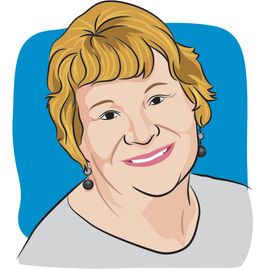- About Us
- Advertise / Support
- Editorial Board
- Contact Us
- CancerNetwork.com
- TargetedOnc.com
- OncLive.com
- OncNursingNews.com
- Terms & Conditions
- Privacy
- Do Not Sell My Information
- Washington My Health My Data
© 2025 MJH Life Sciences™ and CURE - Oncology & Cancer News for Patients & Caregivers. All rights reserved.
Life Is Like a Puzzle: Piecing Things Together After Cancer

Jane Biehl is a 12-year survivor of a very rare form of blood cancer, known as myelodysplastic syndrome (MDS). She has enjoyed several exciting careers including a librarian, counselor, teacher, and writer. She loves to write about surviving cancer, overcoming hearing loss and the wonderful benefits of having a hearing-ear service dog.
Our lives are broken up after a loss, but eventually the pieces are put back together. The hard part is that the new pieces can make a totally different picture.
When I became a rehabilitation counselor several years ago, I had many clients whose lives had been turned upside down. I worked for a state vocational agency helping people with disabilities to obtain a job. We had wonderful resources at our command, including the latest technology, money to assist for college and training and specially trained people to help with resumes and on the job assistance.
Many of the clients I worked with had suffered a debilitating disease, serious injury or economic downsizing causing them to lose their job.
My academic background had prepared me to assist with helping to find the best job. However, academia couldn’t prepare me as a counselor to know how to deal with the emotions the clients felt from their lives being turned upside down. Some were suddenly blinded, others suffered post-traumatic stress disorder from being in a horrible accident and still others were worsening from an insidious disease such as multiple sclerosis.
What do you say to these people? At a loss for words, I found a wonderful book, but have forgotten the title. The story was on how to deal with grief and compared a loss of a loved one to a jigsaw puzzle. The book explained that our lives are broken up after a loss, but eventually the pieces are put back together. The hard part is that the new pieces can make a totally different picture.
People who have endured a disability or disease have suffered a loss. Instead of allowing them to mourn as we do when we lose a loved one, we tell them to go on. There is no memorial service given and no gathering of caring friends and relatives like we traditionally have when someone passes on. The person ends up lonelier than ever. A person who loses the ability to see or hear or becomes ill may have the same emotions as someone who lost a loved one. They may go through the same stages of grief.
I used this analogy of a jigsaw puzzle dozens of times. I would tell clients that their lives had been shaken up. We were putting the pieces back together. The picture would be a new one, and that was the exciting part. I would be part of that journey and their cheerleader. Perhaps the job they found would be even better! An example would be a client who lost his vision while working a blue collar job could go through computer training, receive adaptive equipment and eventually work in an information technology position.
Then, it became my turn to have my life shaken up and experience a new picture. Many people with cancer have to go through terrible losses and come out on the other side with a whole new perspective. I cannot imagine what it is like to have surgery and have a breast removed, part of a colon removed or part of a brain or jaw. Through my cancer journey, I have encountered brave patients who have had to endure this and more. It is very scary, and a whole new picture of oneself is formed. Many times, the survivor feels that they are uglier than before or lost a lot of their self-confidence after the surgery. To add more insult, radiation, chemo and invasive treatments causing hair loss and other side effects add to the stress. The survivor tries valiantly to go on, despite missing and mourning the old picture.
In my case, the scars are less visible. The blood cancer causes a slowing down of the body, overwhelming fatigue and the knowledge I will never be well again. This forces me to develop a whole new outlook.
None of this is an easy process, but it is one we all struggle with daily. It is natural to mourn our old selves and want the energy, the breast, the jaw back to where it was before. However, that will not happen. Maybe new parts can be reconstructed, but it won’t be the same.
Career-wise, I gave up my identity as a teacher, but became a writer and am trying to “teach” through my writing. Do I like the new picture better? Some days I don’t. I know I will always long for the “old” picture. I also realize I need to form a new jigsaw puzzle, rather than leaving the scattered pieces on the table. I have to cherish the new picture because it is all I have. Hopefully it will be enough.
Related Content:



